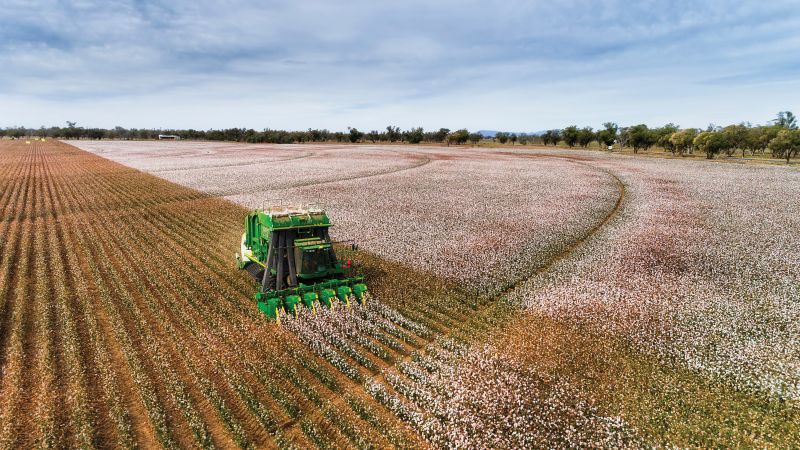Ronnie Lee Is 2020 Cotton Achievement Award Recipient
Ronnie Lee has been described as an all-in type of person. But to be all in on so many different fronts takes the concept to the next level. In addition to his farm and gin, Lee oversees and partners in multiple other agricultural enterprises. And his resume of advocacy on behalf of the cotton industry runs long. That’s why the Bronwood, GA, agriculturalist was named winner of the 2020 Cotton GrowerSM Cotton Achievement Award, sponsored by NexGen brand cottonseed.
On the home front, as managing partner of Lee Farms, he raises cotton, peanuts, small grains, pecans, and cattle. He owns and operates McClesky Cotton Company, a ginning and warehousing operation with locations in Bronwood and Albany. He is a part owner of the Chickasha of Georgia seed mill. And, the family also operates a pecan packing facility, a gin repair company, a trucking service, and an aerial application business.
On the advocacy front, his plate is equally full. Lee, who served as National Cotton Council (NCC) Chairman in 2017, was a NCC delegate from 2003-2016, and served as a NCC Director in 2015 and as the NCC’s Vice Chairman in 2016. In 2014, he served as American Cotton Producers Vice Chairman representing the Southeast. He currently is a Cotton Incorporated Director.
Lee has been involved in regional, state, and local organizations. He is a past President and Chairman of Southern Cotton Growers and is a former Chairman of the Farm Services Agency’s Georgia State Committee. He also served on the Georgia Feed and Grain Dealers Association, National Peanut Buying Points Association, and American Peanut Shellers Association.
“Serving as Chairman of the NCC was an honor of a lifetime,” Lee says. “I’ve also been involved with Cotton Incorporated for 18 years. I will be stepping away from that this year, but it was another tremendous experience. Both organizations are made up of fine, hard-working people, and I’ve made great friendships in both over the years.”
As for the Cotton Achievement Award, Lee says he honored and humbled by the recognition. “I know there’s a long list of fine people who have won this award, so it is a real honor that I appreciate,” he says.
Road Warrior
Serving as NCC Chairman and in other organizations, Lee has been asked to travel (a lot) over the years. In fact, that’s one reason why he was asked to serve on the Council.
“One day I had a call with Bob McClendon, who had served as NCC Chairman in the past,” Lee says. “He told me the Council would like me to serve as Chairman. I said, ‘There’s probably better people for job.’ And Bob said, ‘Maybe so, but you’ll travel and go to the meetings.’ So, that’s what I did. I can’t tell you how many planes I’ve been on over the years.
“There’s a lot of folks that can’t travel and dedicate that much time, but the way we are structured I was able to. My three sons Ron, Chandler, and Neil are very involved in our businesses, and we’ve been blessed with good help and amazing people working with us over the years.”
Lee adds that the structure of the cotton industry and representation by organizations like the NCC set it apart from other commodities. Having all seven segments of the industry actively involved brings considerable influence.
“I have traveled to Washington several times a year to represent cotton issues for a long time,” he says. “One thing I’ve noticed is that the industry and NCC has pretty good clout in DC. If you look at the number of Cotton Belt states that stretch across the country and having NCC to unify the seven segments, it makes a difference with policymakers.”
“The cotton industry has been well-served by Ronnie Lee and his advocacy,” says fellow ginner and Cotton Achievement Award winner Chuck Coley, from Vienna, GA. “Ronnie is a mover and a shaker. When the politicians up in Washington are not moving, Ronnie gets to shaking, and they start moving.”
The Big Issues
Without question, Lee says growing cotton consumption is the number one priority for the industry. It has been a long fight, and there’s still a long way to go to keep cotton in the game against synthetics. He adds the reliance on China to move U.S. cotton presents challenges.
“I remember when we got into cotton back in 1995, I think about a third of the U.S. crop was being exported,” he says. “Today, it’s at least two-thirds or more.”
But the good news is cotton has great story to tell, Lee says. “Cotton is a sustainable, natural fiber that is biodegradable and not polluting. We’ve got to communicate that to this new generation of consumers and get them to come back to cotton. Cotton Incorporated is pushing that hard.”
Toward that goal, the U.S. Cotton Trust Protocol is one initiative that could move the consumption needle. Currently, there is a major push to get growers to sign up for the sustainability program.
“When we were developing the Trust Protocol, we met with most all the other commodity groups to learn what they were doing,” Lee says. “We decided that we wanted cotton’s sustainability program to be better than the rest, and I think that’s what we’ve accomplished with the Protocol. Some growers might wonder why we need it, but this is what the buyers and ultimately consumers want.”
The other big challenge the industry must address is contamination. As a ginner, Lee has been acutely aware of the problem since day one.
“I think we will get to a solution, but we’ve got work to do yet,” Lee says. “I think plastic (round bales) is here to stay, so we have to look to technology to help us address it. There’s an electric eye technology (VIPR) that kicks out contamination in the ginning process. It has been in trials and is looking promising. I think technology like that is going to be the best solution. We are going to have go in that direction to reduce the contamination. We can’t afford not to.”











